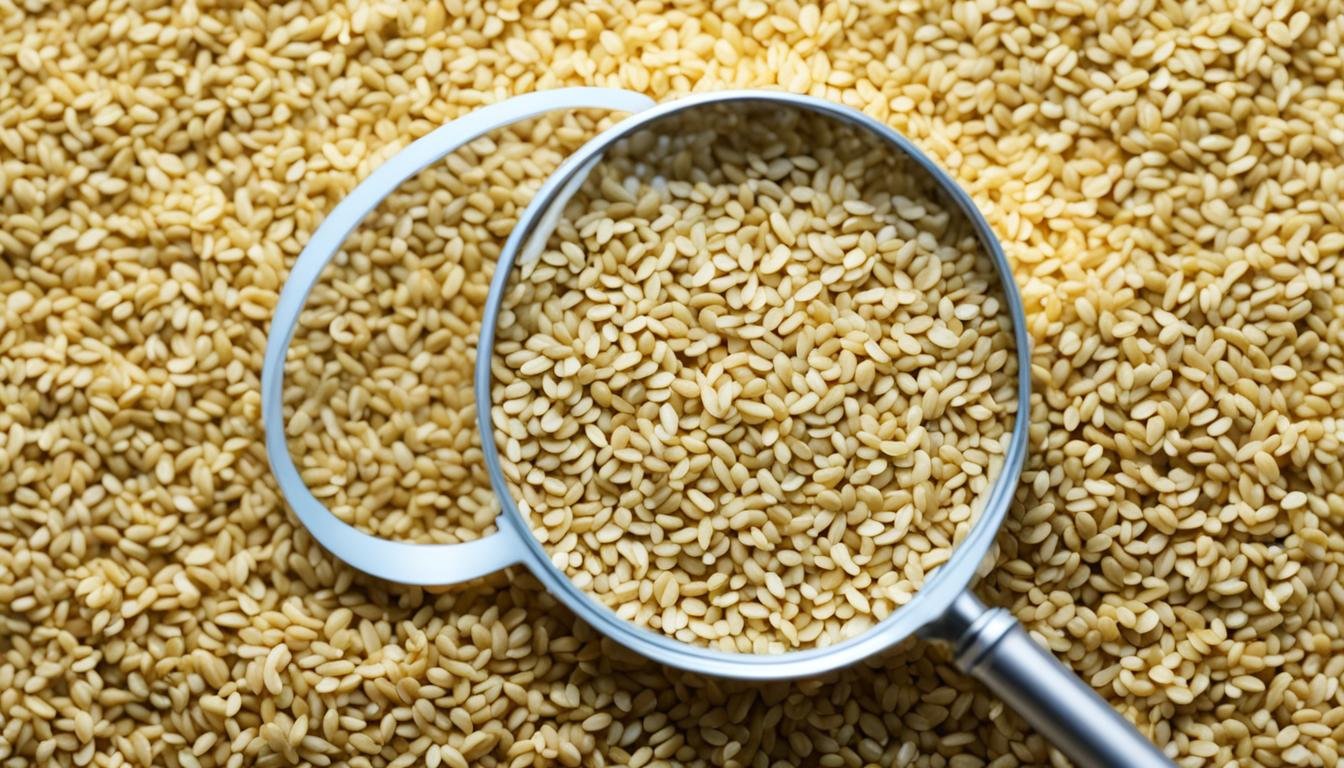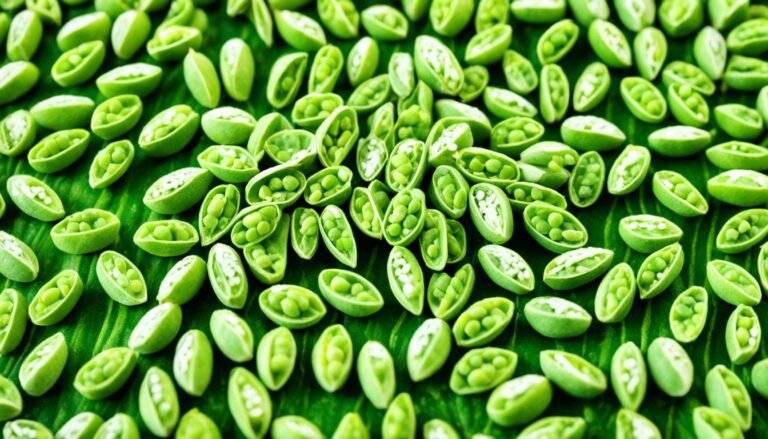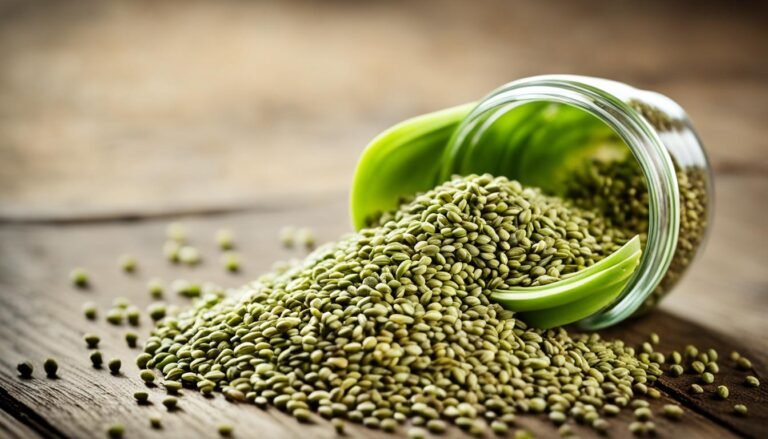Useful Nutrition Facts for Sesame Seeds

Did you know that just 3 tablespoons of unhulled sesame seeds give you 12% of the daily fiber you need? These small seeds are full of nutrients that boost your health. Lets drilled down about more nutrition facts for sesame seeds..
Sesame seeds are great for your heart. They help lower cholesterol and triglyceride levels, which are risk factors for heart disease. Eating hulled sesame seeds every day can cut “bad” LDL cholesterol by 10% and triglycerides by 8%.
They’re not just good for your heart. Sesame seeds are also a plant-based protein source, giving you 5 grams per 3-tablespoon serving. They’re packed with vitamins and minerals like calcium, magnesium, manganese, and zinc. These are important for strong bones.
If you want to support your heart health, strengthen your bones, or just eat healthier, sesame seeds are a great choice. Add them to your meals, snacks, and even baked goods. Enjoy their tasty nutty flavor and their amazing nutritional benefits.
Introduction to Sesame Seeds
Origins and History
Sesame seeds have a long and rich history, dating back over 5,000 years to the Indian subcontinent. These small seeds were once a key trade item and are now a big part of Asian cuisines and traditional Chinese medicine. Today, they are used in many dishes, supplements, and medicines worldwide.
There are many colors of sesame seeds, like black, brown, tan, gray, gold, and white. Black sesame seeds, mainly from Asia, are thought to be more nutritious than the usual white ones. In 2018, Sudan, Myanmar, and India led in sesame seed production, showing its global importance.
Sesame seeds are packed with 21.9% protein and 61.7% fat, making them a great source of nutrients. They are full of copper, calcium, iron, zinc, and magnesium. Their high oil content makes them popular in baking and other industries.
| Nutrient | Content per 100g |
|---|---|
| Protein | 21.9g |
| Fat | 61.7g |
| Copper | 2.29mg |
| Calcium | 1450mg |
| Iron | 9.3mg |
| Zinc | 12.20mg |
| Magnesium | 87% of daily value |

Nutritional Composition of Sesame Seeds
Sesame seeds are full of important nutrients. A 3-tablespoon (30-gram) serving of sesame seed nutrition facts is packed with fiber, protein, healthy fats, and lots of sesame seed vitamins and sesame seed minerals. It gives you 12% of the daily fiber you need, 25% of magnesium, 32% of manganese, and 21% of zinc.
These seeds are also a great source of B vitamins like thiamine, niacin, and vitamin B6. They have plant compounds like lignans and phytosterols that are good for your health.
- Sesame seeds have the most phytosterols among nuts and seeds in the US, with 400 to 413 milligrams per 100 grams.
- They are full of copper, giving you 163% of your daily value per cup. This helps your immune system and makes red blood cells.
- A quarter-cup of dried sesame seeds is loaded with vitamins and minerals that are good for you.
The sesame seed nutrition facts show how these small seeds are really powerful. Adding sesame seeds to your meals is a smart way to get more nutrients and health benefits.

Promoting Heart Health
Sesame seeds are great for your heart health. They have a good mix of fats that can lower “bad” LDL cholesterol and triglycerides. These seeds are also packed with lignans and phytosterols, which help lower cholesterol.
A study showed that eating 5 tablespoons of sesame seeds every day for 2 months helped lower LDL cholesterol by 10%. It also cut triglycerides by 8%. This shows how sesame seeds heart health benefits can be significant.
Lowering Cholesterol and Triglycerides
Sesame seeds are full of compounds that can reduce cholesterol and triglycerides. They have unsaturated fats, lignans, and phytosterols. These work together to lower harmful cholesterol and triglyceride levels. Adding these seeds to your diet is an easy way to support your heart.
| Nutrient | Amount in 3 Tablespoons of Sesame Seeds | % of Recommended Daily Intake |
|---|---|---|
| Fiber | 3.2 grams | 13% of 25-34 grams recommended daily |
| Magnesium | 108 mg | Approximately 8% of recommended daily intake |
| Carbohydrates | 6 grams | – |
| Fat | 13 grams | – |
| Protein | 5 grams | – |
| Thiamin | 0.18 mg | 18% of recommended daily intake |
| Niacin | 0.8 mg | 8% of recommended daily intake |
Sesame seeds are full of fiber, unsaturated fats, and plant compounds that are good for your heart. Adding them to your meals can help support your heart health and overall well-being.

Regulating Blood Sugar Levels
Sesame seeds could be key in managing blood sugar levels. They are packed with protein and healthy fats. These nutrients help slow down sugar absorption, preventing blood glucose spikes.
A 100-gram serving of white sesame seeds has 12 grams of fiber and 18 grams of protein. This mix helps control insulin levels. It’s great for people with diabetes or those trying to keep their blood sugar in check.
Sesame seeds also contain a compound called pinoresinol. This compound might slow down the digestion enzyme maltase. Maltase breaks down sugar maltose. So, slowing it down could lead to lower blood sugar levels after eating sesame seeds.
| Nutrient | Amount per 100g |
|---|---|
| Fiber | 12g |
| Protein | 18g |
| Magnesium | 351mg |
More studies are needed, but the current findings are promising. Adding sesame seeds to your diet could help those with sesame seeds blood sugar or sesame seeds diabetes issues. Their nutrients and effects on insulin and blood sugar make them a smart choice for a healthy lifestyle.

Nutrition Facts for Sesame Seeds
Sesame seeds are packed with vitamins, minerals, and plant compounds. A 3-tablespoon (30-gram) serving has 160 calories, 13.6 grams of fat, 7.3 grams of carbs, and 4.8 grams of protein.
These seeds are a great source of minerals. A 30-gram serving gives you 22% of the Daily Value (DV) for calcium, 23% DV for iron, 22% DV for magnesium, and 14% DV for phosphorus. They also have a lot of manganese (31% DV) and selenium (18% DV).
| Nutrient | Amount per 30g Serving | % Daily Value |
|---|---|---|
| Calories | 179 | – |
| Total Fat | 17.4g | 22% |
| Saturated Fat | 3.14g | 16% |
| Carbohydrates | 5.5g | 2% |
| Dietary Fiber | 2.4g | 9% |
| Protein | 5.5g | 11% |
| Calcium | 201mg | 25% |
| Iron | 3.1mg | 22% |
| Magnesium | 111mg | 30% |
| Phosphorus | 216mg | 31% |
| Manganese | 0.45mg | 23% |
| Selenium | 2.5mcg | 18% |
Sesame seeds are also full of healthy fats like monounsaturated and polyunsaturated fats. They have nutrients and compounds that help with heart health, bone strength, and immune function.
Supporting Bone Health
Sesame seeds are a great way to support bone health. They are full of nutrients that help keep bones strong. These include calcium, magnesium, and manganese, which are key for preventing osteoporosis.
A 3-tablespoon serving of unhulled sesame seeds gives you 22% of the daily calcium you need. It also gives you 25% of the magnesium and 32% of the manganese you need. These minerals help bones form and get stronger, reducing the chance of breaks.
To get the most out of these nutrients, soak, roast, or sprout sesame seeds. This makes them easier for your body to absorb. Adding sesame seeds to your meals in these ways helps your body use their bone-boosting benefits.
- Sesame seeds are a rich source of calcium, providing 22% of the RDI in a 3-tablespoon serving.
- Sesame seeds are high in magnesium, offering 25% of the RDI in a 3-tablespoon serving.
- Sesame seeds are an excellent source of manganese, containing 32% of the RDI in a 3-tablespoon serving.
Adding sesame seeds to your diet can help keep your bones strong and lower your risk of osteoporosis. Use them in your meals, snacks, and baking to support your bones.
Anti-Inflammatory and Antioxidant Properties
Sesame seeds are more than just tasty in your meals. They are full of anti-inflammatory and antioxidant benefits. These small seeds are packed with lignans and sesamin, which fight inflammation. They also have vitamin E, known as gamma-tocopherol, which helps protect against heart disease.
Fighting Oxidative Stress
Studies in animals and humans show that eating sesame seeds boosts antioxidants in the blood. This helps fight off harmful free radicals and lowers the risk of chronic diseases linked to oxidative stress. Adding sesame seeds to your meals can be a great way to reduce inflammation and improve health.
Research has shown that eating a quarter cup of sesame seeds daily can help people with knee osteoarthritis. It lowered inflammation markers and pain levels from nine to just three and a half.
Also, sesamin in sesame seeds can help lower blood pressure in a month. This could cut the risk of fatal strokes and heart attacks by up to 5%.
Sesame seeds are a superfood with lots of nutrients like oils, lignans, antioxidants, protein, fiber, and vitamins and minerals. They can help reduce inflammation and oxidative stress in your body. Adding them to your diet can support your overall health and well-being.
Immune System and Blood Cell Formation
Sesame seeds are a powerhouse for your immune system and blood cell formation. They are full of nutrients that help keep your immune response strong and support blood cell production.
Iron is a key nutrient in sesame seeds. It’s vital for making red blood cells. These cells carry oxygen throughout your body. Having enough iron means your red blood cells work well, giving your cells the oxygen they need.
Sesame seeds are also rich in copper. Copper is important for a strong immune system. It helps make white blood cells, which fight off infections and pathogens.
- Zinc in sesame seeds is also crucial for your immune system. It helps immune cells develop and get ready to fight threats.
- Vitamin B6 in sesame seeds helps make antibodies. This boosts your immune system’s power to fight off germs.
Eating sesame seeds gives your body a boost for your immune system and blood cell health. Iron, copper, zinc, and vitamin B6 in these seeds keep your immune system strong and your blood cells healthy. This helps you stay well overall.
| Nutrient | Role in Immune System and Blood Cell Formation |
|---|---|
| Iron | Essential for the production of red blood cells, which transport oxygen throughout the body. |
| Copper | Crucial for the development and maintenance of a robust immune system, supporting the production of white blood cells. |
| Zinc | Helps in the development and activation of immune cells, enabling an effective response against threats. |
| Vitamin B6 | Aids in the production of antibodies, enhancing the immune system’s ability to neutralize invading microorganisms. |
Conclusion
Sesame seeds are packed with vitamins, minerals, healthy fats, and plant compounds. They help keep your heart healthy, support strong bones, and control blood sugar levels. Adding sesame seed nutrition to your meals is a great choice for your health.
Adding sesame seeds to your diet is easy and beneficial. They are versatile and full of nutrients. This makes them a great healthy addition to any meal.
Sesame seeds are good for your heart, bones, and blood sugar levels. They are a superfood that should be in your diet. Including them in your meals can bring many health benefits and add flavor to your food.
FAQ
What are the key nutrients found in sesame seeds?
Sesame seeds are full of important nutrients like fiber, protein, and healthy fats. They also have vitamins and minerals. These include calcium, magnesium, and manganese, among others.
How do sesame seeds promote heart health?
Sesame seeds can help keep your heart healthy by lowering cholesterol and triglyceride levels. They have a good mix of fats and plant compounds. These can help lower cholesterol.
Can sesame seeds help regulate blood sugar levels?
Yes, sesame seeds can help control blood sugar. They have a low carb content and are high in protein and healthy fats. A compound in them may also help lower blood sugar levels.
What are the key nutrients in sesame seeds that support bone health?
Sesame seeds are packed with nutrients that are good for bones. These include calcium, magnesium, and manganese. These minerals help keep bones strong and prevent osteoporosis.
How do sesame seeds exhibit anti-inflammatory and antioxidant properties?
Sesame seeds have anti-inflammatory and antioxidant properties. This is due to lignans, sesamin, and vitamin E. These compounds help protect against cell damage and inflammation.
How do the nutrients in sesame seeds support immune system function and blood cell formation?
Sesame seeds have nutrients important for the immune system and blood cell production. These include iron, copper, zinc, and vitamin B6. These help make red blood cells and support immune health.







One Comment